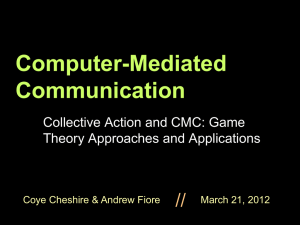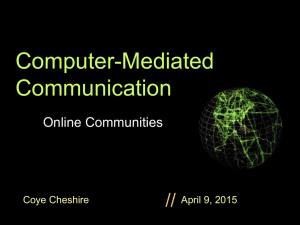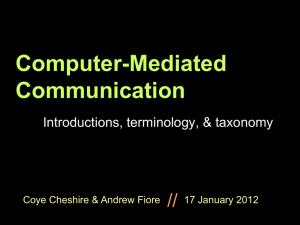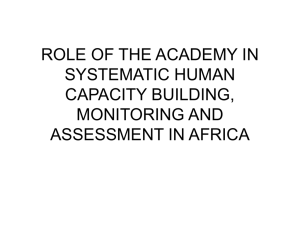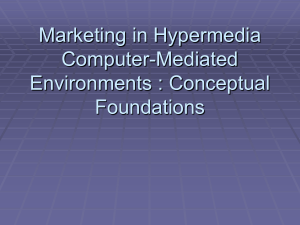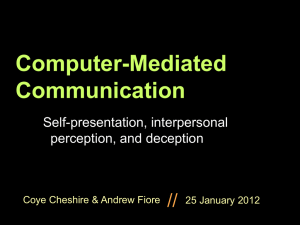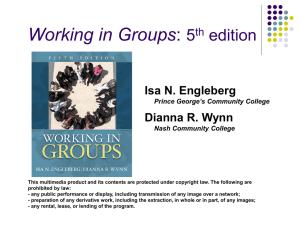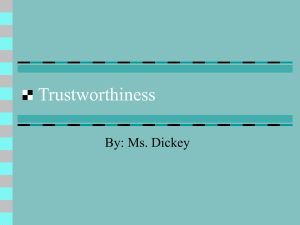slides - Courses
advertisement
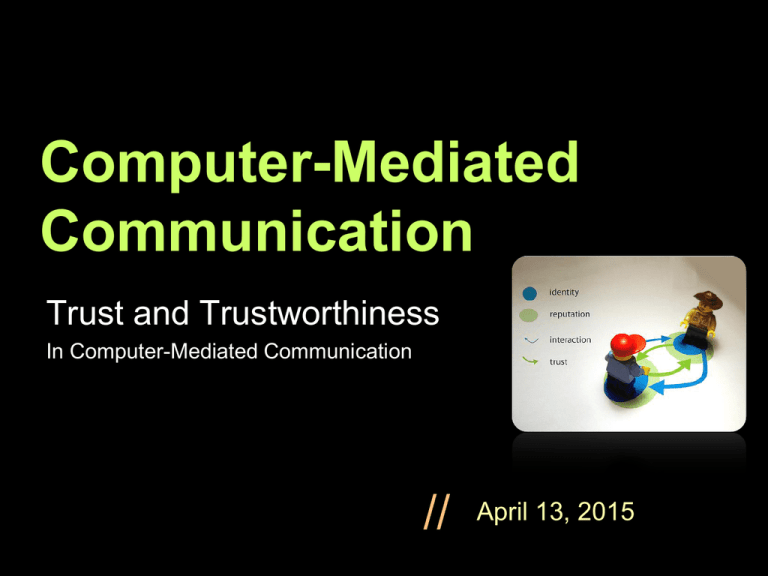
Computer-Mediated Communication Trust and Trustworthiness In Computer-Mediated Communication // April 13, 2015 First of all… Why Care about Internet Trust? 4/13/2015 Computer-Mediated Communication 1 The Internet 4/13/2015 Computer-Mediated Communication 2 Revisiting Privacy and Security: Issues of Trust …”trust” others not to share our information …”trust” systems to route and protect information …”trust” 3rd parties not to collect/track our information traces and not use them publicly for advertising, targeting potential criminal behavior, non-normative behavior, etc? 4/13/2015 Computer-Mediated Communication 3 TRUST AND TRUSTWORTHINESS 4/13/2015 Computer-Mediated Communication 4 Defining Trustworthiness An assessment of one’s future behavior ‘Trustworthiness’ is a characteristic that we infer Theoretically linked to perceived competence and motivations of a given individual Competence to act in a way we deem appropriate Motivation to act in our best interests 4/13/2015 Computer-Mediated Communication 5 Competence and Motivation in Online Goods and Services: Which is More Important to Potential Buyers? 4/13/2015 Computer-Mediated Communication 6 Results: Who is the Most Trustworthy Seller? High Competence and Low Motivation High Motivation and Low Competence Competence to act in a way we deem appropriate Motivation to act in our best interests Camera (goods) 4/13/2015 Photography/ Web(Service) Computer-Mediated Communication 7 Competence! Motivation! Vs. 4/13/2015 Computer-Mediated Communication 8 Signaling Trustworthiness Symbols indicators of trust-warranting properties in a person (Conventional Signals) Symptoms by-product of actions that are associated with trust (Assessment Signals) 4/13/2015 Computer-Mediated Communication 9 The multidisciplinary problem of trust “Although some philosophers write about trust that is not interpersonal, including ‘institutional trust’… trust in government… and ‘self-trust’… most would agree that these forms of ‘trust’ are coherent only if they share important features of (i.e. can be modeled on) interpersonal trust. This is why I say that the dominant paradigm of trust is interpersonal.” (McLeod 2006) 4/13/2015 Computer-Mediated Communication 10 Different Definitional Approaches to Trust Cognitive Psychology Trust as “personality trait” (dispositional trust) Trust as learned experience (learned trust) Philosophy Trust versus reliance, security Sociology and Social Psychology Trust as behavior (situational and relational trust) Trust builds through risktaking Assessment of trustworthiness based on perceptions of others’ characteristics 4/13/2015 Computer-Mediated Communication 11 Defining Interpersonal Trust (Sociological Use) “Trust exists when one party to the relation believes the other party has incentive to act in his or her interest or to take his or her interest to heart.” “one in which confidence is placed” “to have or place confidence in; depend on” 4/13/2015 “to place in the care of another; entrust” “dependence on something future or contingent” “reliance on something in the future; hope” Computer-Mediated Communication 12 Trust-Building in the Sociological, Relational Sense Interpersonal Trust Trust as an attitude about others’ desire and ability to act in a positive way towards us in a given context Involves repeated interactions between parties Theoretically linked to risk-taking Also distinct from the concept of ‘cooperation’ 4/13/2015 Computer-Mediated Communication 13 Conditions for Trust Trust is optimistic; the opposite is distrust. The truster accepts some level of risk or vulnerability There must exist a potential for betrayal See: http://plato.stanford.edu/entries/trust/ 4/13/2015 Computer-Mediated Communication 14 “Trust on the internet is surely not an attitude at all. It starts with a choice, do you choose to trust your online interactions or not? Then the trust is measured off of what follows…Attitude was the wrong word.Trust is a choice just like the choice to participate in an online community or some sort of virtual interaction.” -Maurice 1/30/12 Cheshire & Fiore — Computer-Mediated Communication 15 “ No noble thing can be done without risks. ” — Michel Eyquem de Montaigne 4/13/2015 Computer-Mediated Communication 16 Risk What is at stake in a given situation/interaction? Risks may be defined by the situation (e.g., a warzone, transition economies, etc.) Risks may be vary across exchange situations with the same partners (in many cases the participants can change the relative risks) 4/13/2015 Computer-Mediated Communication 17 Uncertainty Ambiguity about the result of an interaction 4/13/2015 Computer-Mediated Communication 18 Trust, Uncertainty and Commitment Peter Kollock (1994) – “rice and rubber markets” uncertainty about quality leads to commitment and trust 4/13/2015 Computer-Mediated Communication 19 Sources of Uncertainty in Interpersonal Interaction and Exchange Quality of ‘goods’ or ‘services’ Structural uncertainty of an exchange Uncertainty about finding an exchange partner 4/13/2015 Computer-Mediated Communication ? 20 Betrayal… 4/13/2015 Computer-Mediated Communication 21 Building Trust and Role of Agency Behavioral Components Expected Behavior Observed Behavior Agency and choice are relevant for both parties in dyadic interpersonal relationships (though trust may not be mutual). 4/13/2015 Computer-Mediated Communication 22 What about Trust in Systems? Nissenbaum 2004 Locus of Betrayal If we trust someone to do something, if he/she/it does not do so we are disappointed. But can this ‘betrayal’ really occur with inanimate objects? (computer, online service, software) 4/13/2015 Computer-Mediated Communication 23 “Trust” in Information, Systems, Interfaces? Trust vs. Credibility Trust vs. Reliability, Security 4/13/2015 Computer-Mediated Communication 24 Confidence, Credibility, Reliability in Systems In all fairness, it is increasingly difficult to tell the difference between human interaction versus a human-machine interaction. 4/13/2015 Computer-Mediated Communication 25 Break 4/13/2015 Computer-Mediated Communication 26 Using Games and Game Theory to Understand Trust-Building 4/13/2015 Computer-Mediated Communication 27 Rules for the CMC trust game… Two players Each player gets 5 items from the experimenter on each round. Players simultaneously decide whether to ‘entrust’ 0 to 5 of their items to the other player. Players decide whether to return the items to the partner or not. If player returns the items, the experimenter DOUBLES the amount returned to the partner (operationalizing benefit of fulfilled entrustment). But, each player can just keep the entrusted items; then nothing is returned to the partner. 4/13/2015 Computer-Mediated Communication 28 For Example… Player A entrusts 1 X’s Player A Player A returns the 3 X; Player B gets 6X! Player B Player B returns the 1 X; Player A gets 2X! At the end of the round, you keep Player whatever you didBnot entrust, plus whatever you earned or kept from your entrusts 3 X’s partner!! 4/13/2015 Computer-Mediated Communication 29 Let’s play a few rounds… 4/13/2015 Computer-Mediated Communication 30 Debriefing… What were the risks? What were the sources of uncertainty? Does the game play any differently when there are repeated interactions with the same partner, compared to when there are new, random partners? 4/13/2015 Computer-Mediated Communication 31 Bos et. al 2002: Effects of four types of CMC Channels on Trust Development 4/13/2015 Computer-Mediated Communication 32 Bos et. al 2002: Effects of four types of CMC Channels on Trust Development 4/13/2015 Computer-Mediated Communication 33 “Having worked in collaborative offices for almost 20 years, with three of those years being part of a 10person team with people in 4 locations, the kind of trust measured between students in a social game doesn't seem to me to be AT ALL related to the kinds of trust that support effective work, not even as "a good start on developing trust that [coworkers] will fulfill other obligations." Questions of skill, deadline habits, whether someone has shown themselves to be appropriately detail-oriented on a given task-none of these things are related to the particular flavor of "exploitative and self-protective behaviors" measured by the game.” -Lisa 1/30/12 Cheshire & Fiore — Computer-Mediated Communication 34 Other considerations about trust and online social media and CMC… 4/13/2015 Computer-Mediated Communication 35 4/13/2015 Computer-Mediated Communication 36 4/13/2015 Computer-Mediated Communication 37 Different Forms of Trust and Trustworthiness Matter. From: Fiore and Cheshire, “Trust and Computer-Mediated Online Relationships” 4/13/2015 Computer-Mediated Communication 38 “Cheshire writes, " Online dating is largely about learning to use the affordances of online communication channels with low personal risk, with the purpose of finding individuals who are, among other things, sufficiently trustworthy to meet in person." Adding to this point, couldn't it be said that much of the trustworthiness of someone on an online dating site be inferred by other real-life interactions with people from the site. For instance, if nothing bad has happened to you or your friends on previous dates coordinated through the site, might you automatically ascribe more trustworthiness to potential partners overall? While this is specific to situations where you have the opportunity to physically meet those who you are interacting online I think it would be interesting to discuss the ebb and flow between human-to-human trust building on and offline.” -Laura 1/30/12 Cheshire & Fiore — Computer-Mediated Communication 39 What are the “Solutions” to Uncertainty in CMC Environments? Proxies and ‘inferred trustworthiness’ Institutional backing Closed Systems versus Open Systems Experiential, often negativeonly reputations (not explicit) 3rd party (explicit) reputation 4/13/2015 Computer-Mediated Communication 40 “I work on the Open Badges (openbadges.org) project at Mozilla, and I'm particularly attracted to the idea of third-party reputation information as an additional source of data. By seeing that an institution or individual has vouched for a person's competency, I can potentially trust them more in that situation for a given topic. Badges are just one model of how this idea has been implemented -- LinkedIn endorsements is another. And ultimately, I think they're working toward answering a problem that is quite difficult; how can a technical system provide trustworthy signals of an individual's competency?” -Dave “information systems aren't only comprised of technical components and algorithms. For example, we may trust the results and recommendations from Google, LinkedIn, Amazon, Netflix (this one is questionable.), and blame the system or people associated with the maintenance of the system if they aren't in line with user expectation. But, we forget the ratings and results are in fact not just algorithms--they are the actions of ordinary Internet users. Online activities from the users can influence the results and the degree which something is relevant to us. However, we often times fail to see or remember aspect is a part of the black box.” -Tine 1/30/12 Cheshire & Fiore — Computer-Mediated Communication 41 The Downside to Over-Commitment and Trust? Mizruchi and Stearns (2001) commercial bankers and customers: Uncertainty leads to reliance on close relations/colleagues with strong ties Reliance on trust networks leads banks to be less successful in closing deals, lower organizational effectiveness The key point is that trust networks are important for a community, but we also have to be willing to take chances and risks– nothing worth having comes without risk. 4/13/2015 “We’ve considered every potential risk except the risks of avoiding all risks.” Computer-Mediated Communication 42 Also…The Downside to Sanctions and Assurance Structures Reliance on interpersonal mechanisms of trust building often replaced by organizational assurance structures (monitoring and sanctioning) Paradoxically, these assurance structures reduce possibility of ongoing trust relations 4/13/2015 Computer-Mediated Communication 43 The Certainty-Trust Contradiction 4/13/2015 Computer-Mediated Communication 44
